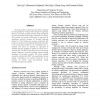162 search results - page 21 / 33 » Minimizing Average Finish Time in P2P Networks |
SENSYS
2003
ACM
14 years 20 days ago
2003
ACM
For many sensor network applications such as military surveillance, it is necessary to provide full sensing coverage to a security-sensitive area while at the same time minimizing...
GLOBECOM
2007
IEEE
14 years 1 months ago
2007
IEEE
— Energy-ef ciency is one of the major concerns in wireless sensor networks since it impacts the network lifetime. In this paper, we investigate the relationship between sensor n...
IPCCC
2007
IEEE
14 years 1 months ago
2007
IEEE
Existing packets scheduling algorithms designed for energy-efficient wireless networks ignore important features of periodic packets, thereby being inadequate for periodic packets...
INFOCOM
2006
IEEE
14 years 1 months ago
2006
IEEE
— We consider the fundamental delay tradeoffs for minimizing energy expenditure in a multi-user wireless downlink with randomly varying channels. First, we extend the BerryGallag...
INFOCOM
2003
IEEE
14 years 21 days ago
2003
IEEE
— A method commonly used for packet flow control over connections with long round-trip delays is “sliding windows”. In general, for a given loss rate, a larger window size a...

